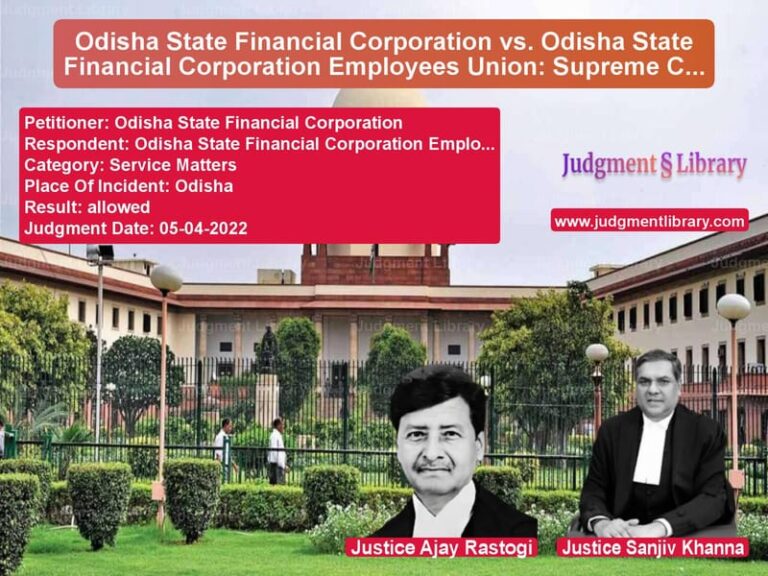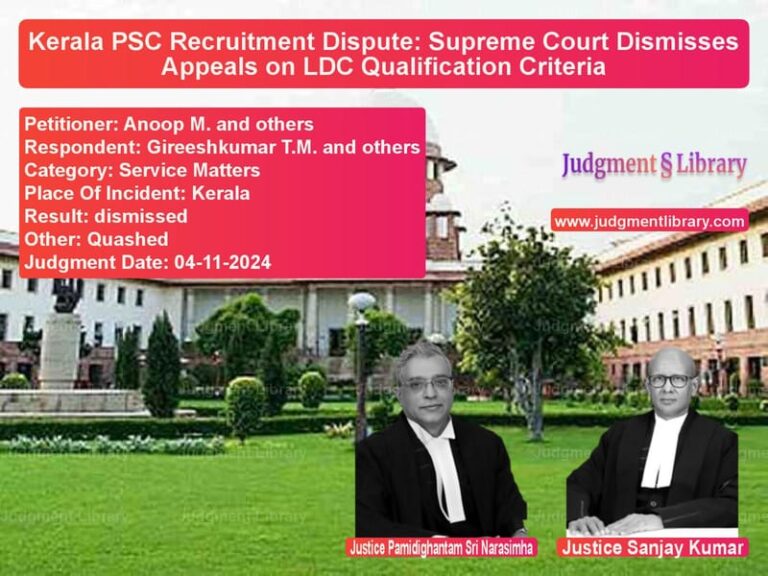Supreme Court Acquits Vinod Kumar in Murder Case Citing Lack of Conclusive Evidence
The Supreme Court of India, in its judgment dated February 13, 2025, acquitted Vinod Kumar in a murder case, setting aside the conviction upheld by the Delhi High Court. The Court ruled that the circumstantial evidence presented by the prosecution failed to establish guilt beyond a reasonable doubt. The ruling reaffirmed the principle that an accused cannot be convicted unless the chain of evidence is complete and conclusive.
Background of the Case
Vinod Kumar was convicted under Section 302 of the Indian Penal Code (IPC) for the alleged murder of Dharminder, his neighbor. The prosecution claimed that on July 12, 1995, Vinod Kumar took Dharminder from his house, and two days later, the latter was found dead. The trial court sentenced Kumar to life imprisonment, a decision that was later upheld by the Delhi High Court. Kumar then approached the Supreme Court, challenging his conviction.
Read also: https://judgmentlibrary.com/supreme-court-commutes-death-sentence-in-karnataka-double-murder-case/
Prosecution’s Version
The prosecution’s case was primarily based on circumstantial evidence and relied heavily on the testimonies of the deceased’s parents. The key points of the prosecution’s argument were:
- Vinod Kumar was last seen with the deceased on the afternoon of July 12, 1995.
- When the deceased’s mother (PW-3) inquired about her son’s whereabouts, the appellant gave evasive replies.
- The accused absconded after the missing complaint was lodged.
- Bloodstained clothes were recovered at the instance of the accused.
Petitioner’s Arguments (Vinod Kumar)
The defense counsel challenged the conviction, arguing that the case was based on weak circumstantial evidence and unreliable witness statements. The defense highlighted the following points:
- The prosecution’s case lacked direct evidence linking Vinod Kumar to the crime.
- The key witness, PW-3 (the deceased’s mother), was declared hostile and gave inconsistent statements.
- PW-1 (the deceased’s father) admitted that he was asleep at the time of the incident and did not witness anything.
- The alleged last-seen evidence was not corroborated by other witnesses.
- The accused’s so-called evasive answers were not substantive evidence of guilt.
- The bloodstained clothes were not conclusively linked to the crime.
Respondent’s Arguments (State of Delhi)
The prosecution, represented by the State of Delhi, contended that the circumstantial evidence was strong enough to sustain the conviction. The prosecution relied on the following points:
- PW-3, the deceased’s mother, testified that Vinod Kumar took Dharminder with him, proving the last-seen evidence.
- The accused’s conflicting statements regarding the victim’s whereabouts showed his involvement.
- The discovery of the deceased’s body in a locked bathroom and the recovery of bloodstained clothes at the accused’s instance pointed to his guilt.
- Vinod Kumar’s absconding after the police inquiry further strengthened the case.
Supreme Court’s Observations
The Supreme Court carefully examined the evidence and pointed out critical flaws in the prosecution’s case. The Court stated:
“The prosecution’s case is based on circumstantial evidence, which must form a complete chain to establish guilt beyond a reasonable doubt.”
The Court further emphasized:
“Unless the view taken by the High Court is found to be totally perverse or impossible, it will not be permissible for this Court to interfere with the same.”
The Court made the following observations:
- PW-3’s testimony contained multiple contradictions and omissions, making it unreliable.
- PW-1 did not see the accused taking the deceased away, as he was asleep at the time.
- The alleged last-seen evidence was weak and did not conclusively establish the accused’s involvement.
- While the accused’s absconding could be suspicious, it was not conclusive proof of guilt.
- The prosecution failed to establish a clear motive for the crime.
The Court also pointed out procedural errors in the trial court’s handling of the witness testimonies, stating:
“The Trial Court improperly included prior witness statements in the deposition without proving them through the investigating officer.”
Final Judgment
The Supreme Court ruled:
- The conviction of Vinod Kumar was not supported by conclusive evidence.
- The judgment of the Delhi High Court and trial court was set aside.
- Vinod Kumar was acquitted of all charges.
- The bail bonds furnished by the appellant were canceled.
Impact of the Judgment
The judgment has significant implications for criminal law in India:
- Strengthening the Standard for Circumstantial Evidence: The ruling reinforces that circumstantial evidence must be conclusive to sustain a conviction.
- Preventing Wrongful Convictions: The judgment ensures that individuals are not convicted based on weak or inconsistent evidence.
- Clarifying the Burden of Proof: The ruling reiterates that the prosecution must establish guilt beyond a reasonable doubt.
- Limiting the Role of Speculative Evidence: The judgment discourages reliance on assumptions and uncorroborated witness testimonies.
Conclusion
The Supreme Court’s judgment in Vinod Kumar v. State of Delhi is a landmark ruling that reinforces the importance of solid and consistent evidence in criminal cases. The decision ensures that convictions are based on indisputable proof rather than mere suspicion, thereby upholding the fundamental principles of justice.
Petitioner Name: Vinod Kumar.Respondent Name: State (Govt. of NCT of Delhi).Judgment By: Justice Abhay S. Oka, Justice Ujjal Bhuyan.Place Of Incident: Delhi.Judgment Date: 13-02-2025.
Don’t miss out on the full details! Download the complete judgment in PDF format below and gain valuable insights instantly!
Download Judgment: vinod-kumar-vs-state-(govt.-of-nct-supreme-court-of-india-judgment-dated-13-02-2025.pdf
Directly Download Judgment: Directly download this Judgment
See all petitions in Murder Cases
See all petitions in Bail and Anticipatory Bail
See all petitions in Judgment by Abhay S. Oka
See all petitions in Judgment by Ujjal Bhuyan
See all petitions in allowed
See all petitions in Quashed
See all petitions in supreme court of India judgments February 2025
See all petitions in 2025 judgments
See all posts in Criminal Cases Category
See all allowed petitions in Criminal Cases Category
See all Dismissed petitions in Criminal Cases Category
See all partially allowed petitions in Criminal Cases Category







